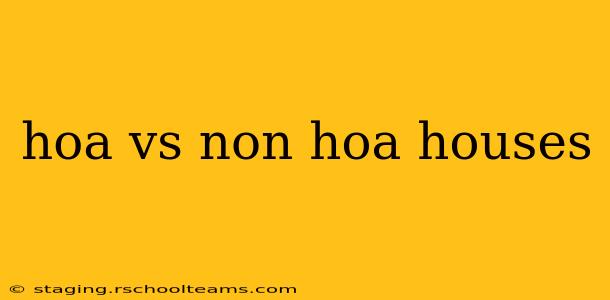Choosing between a house with a homeowner's association (HOA) and one without can significantly impact your lifestyle and finances. This detailed comparison explores the key differences, helping you make an informed decision that aligns with your priorities.
What is an HOA?
A homeowner's association (HOA) is a governing body responsible for maintaining the common areas and enforcing the rules and regulations within a specific community, such as a condominium complex, planned unit development (PUD), or subdivision. HOAs typically collect monthly or annual fees from homeowners to cover expenses related to landscaping, pool maintenance, security, and other amenities. They have the power to enforce rules concerning property aesthetics, pet ownership, and even noise levels.
HOA vs. Non-HOA: Key Differences
The core difference lies in the level of community governance and associated costs. HOA communities offer a structured environment with maintained common areas and established guidelines, while non-HOA communities provide greater freedom and autonomy but require individual responsibility for property upkeep and exterior maintenance.
HOA Houses: Pros and Cons
Pros:
- Curb Appeal and Property Values: HOAs often contribute to maintaining a consistent aesthetic, potentially boosting property values. Well-maintained common areas enhance the overall attractiveness of the neighborhood.
- Amenities: Many HOA communities offer amenities like swimming pools, fitness centers, playgrounds, and clubhouses, providing recreational opportunities for residents.
- Community Feel: HOAs can foster a stronger sense of community through organized events and shared responsibilities.
- Simplified Maintenance: HOA fees often cover the maintenance of common areas, freeing homeowners from these responsibilities.
Cons:
- HOA Fees: Monthly or annual fees can be substantial, adding to your housing costs. These fees can increase unexpectedly.
- Restrictions: HOAs enforce strict rules and regulations, potentially limiting your freedom to customize your property or engage in certain activities. These can range from paint color restrictions to limitations on pet ownership and vehicle types.
- Conflict with HOA: Disputes with the HOA over rule enforcement can be frustrating and time-consuming.
- Lack of Transparency: Some HOAs may lack transparency in their financial practices and decision-making processes.
Non-HOA Houses: Pros and Cons
Pros:
- Freedom and Flexibility: You have complete control over your property, including landscaping, exterior modifications, and pet ownership.
- Lower Monthly Costs: No HOA fees to pay, saving a significant amount of money each month.
- No HOA Restrictions: You aren't bound by restrictive covenants or rules.
Cons:
- Higher Maintenance Costs: You are responsible for all aspects of property maintenance, including landscaping, snow removal, and exterior repairs.
- Potential for Lower Property Values: Lack of consistent maintenance can lead to decreased property values compared to HOA-managed communities.
- Less Community Feel: There is often less of a sense of community compared to HOA-managed communities.
What are the typical HOA fees?
HOA fees vary significantly depending on the community's size, amenities, and services offered. They can range from a few hundred dollars to several thousand dollars per year. It's crucial to carefully review the HOA's financial statements and budget before purchasing a property within their jurisdiction.
What are the common rules and regulations enforced by HOAs?
Common rules enforced by HOAs include restrictions on exterior paint colors, landscaping requirements, pet ownership (breed, size, number), vehicle parking, noise levels, and garbage disposal. Specific rules vary widely depending on the HOA. Always review the community's governing documents before committing to a purchase.
Are there any legal protections for homeowners against unfair HOA rules?
In many jurisdictions, homeowners have legal recourse if they believe an HOA is acting unfairly or violating their rights. It's essential to familiarize yourself with the local laws and regulations pertaining to HOAs. Consult with a real estate attorney if you have concerns about HOA rules or practices.
Conclusion
The decision of whether to buy an HOA or non-HOA house hinges on individual preferences and priorities. Those who value convenience, consistent aesthetics, and community amenities may find HOA communities appealing, despite the added costs and restrictions. Those seeking greater autonomy, lower monthly expenses, and freedom from regulations may prefer non-HOA communities, recognizing the increased responsibility for maintenance and upkeep. Carefully weigh the pros and cons of each option based on your specific needs and lifestyle.
